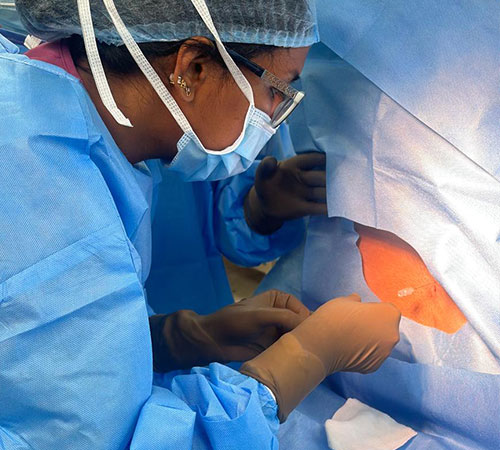It has been a tradition to carry on with a back ache history for life long even till their 70’s by any one who undergoes a spinal anesthesia for surgical delivery or any surgery. It’s quite common to encounter this strong belief which is a myth.

That back pain post-surgery is only caused by spinal anesthesia is the strongest belief I have heard so far. Most women, when they undergo surgery for childbirth or are administered epidural analgesia for normal delivery, or when spinal anesthesia is administered for surgery among the general population, the mindset of people is fixed that they will be having back pain, weight gain and spinal cord issues. Whenever they have any sort of pain or spine issue, it gets attributed to spinal anesthesia. Through this article, as an anesthesiologist, I would like to throw some light on this myth.
Spinal anesthesia is injecting local anaesthetics into the cerebrospinal fluid and making your lower body numb for a while so that you don’t feel pain during surgery or other medical procedures.
Where Is It Administered?
The spinal needle is introduced in the lumbar spine in-between the vertebral space to reach the layers of the spinal cord which carry the cerebrospinal fluid.
When Is It Given?
It is usually administered for surgeries below umbilicus and lower abdomen, pelvic procedures, orthopedic surgery for lower limbs, urology, obstetrics and gynaecology surgeries, wound cleaning and any other lower limb procedures.

How Long Does It Act?
The duration of spinal anesthesia intense blockade is 3-4 hours at maximum. The wearing off of spinal anesthesia takes an hour to several hours according to the drug and dose administered. Patients are able to mobilize after 18 -24 hours, once they completely recover from motor blockade after spinal anesthesia.
Why Is It Safe?
The drug acts local to the region for motor and nerve blockade to abolish movement and pain. Spinal anesthesia does not control or involve breathing and circulation i.e., lungs and heart, and also no overall systemic involvement. Patients will be awake if they are not sedated with intravenous medications. To alleviate anxiety, we sedate them.
For Whom Will Spinal Anesthesia Not Be Administered?
Patients with pre-existing motor neuron diseases, poliomyelitis, disc prolapse, post-spine instrumentation surgery i.e., implant in place, any narrowing of spinal canal, arthritis and scoliosis patients.
Who Benefits from Spinal Anesthesia?
Patients who need to undergo repeated procedures in short intervals. Aged patients to avoid general anesthesia risks. Asthmatic and respiratory illness patients where their respiratory efficiency is not fit for general anesthesia.
Whose Role Is It to Administer Spinal Anesthesia?
Anesthesiologists are the ones who are certified to administer spinal anesthesia in an appropriate clinical setting with equipment to monitor patient’s heart rate, blood pressure and oxygen saturation.
What Are the Side-Effects?
Spinal anesthesia can cause a drop in blood pressure, vomiting, prolonged blockade – numbness which can cause discomfort to the patient while passing urine and headache if there are multiple attempts as the needle tear can take time to heal. Headache if it happens immediately within 12 hours of spinal anesthesia is called spinal headache – post-dural puncture headache. We advise complete bed rest, hydration and coffee intake.
Complications are an almost rare occurrence in our day-to-day skilled safe practice. Due to recent advances the spinal needle sizes have become finer and thinner which causes less pain when while needle is introduced. Also when there is an anticipated difficult spinal anesthesia the patient is evaluated with an X-ray and ultrasound is used to locate the vertebral spaces.
Conclusion:
Spinal anesthesia has more merits to consider – it acts locally, has fewer potential side-effects and has no systemic involvement. Spinal anesthesia should be considered when it’s given as an option of anesthesia for a surgery or procedure is planned under anesthesia keeping its benefits in mind.

Dr. K. Mahalakshmi
Consultant Anaesthesiologist,
Kauvery Hospital Chennai

